Tia Silverthorne Bach's Blog, page 74
June 15, 2012
532 Miles of Books: Fun Facts Friday
Today's Fun Facts Friday post is dedicated to interesting facts about books. Why? Because they bring me much happiness, as do Fridays.
 Largest Library in the World
Largest Library in the World
The Library of Congress, Washington DC, USA contains 28 million books and has 532 miles of shelving. The British Library in London is the second largest.
If you were driving at a constant 70 mph in a car it would take you just under 8 hours to pass them all.
I live near DC, and I haven't been there since I was a kid. Guess who just added a summer field trip with the kids to her summer plans?!
Best Selling Fiction Authors of All Time
1. William Shakespeare
2. Agatha Christie
3. Barbara Cartland
4. Danielle Steele
Best Selling Kindle Author of All Time (to date)
Suzanne Collins, greatly aided by Hunger Games.
World's Most Expensive Book
From a 12/7/10 LA Times article: Naturalist John James Audubon's "Birds of America" sold at auction in London on Tuesday for $11.5 million, making it the world's most expensive book. The book, which was sold by the auction house Sotheby's, was purchased by Micahel Tollemache, a London art dealer who was present in the room.
"Birds of America" is oversize -- more than 3 feet tall and 2 feet wide -- with 435 illustrations. When first published in 1827, the images were printed in black and white and then hand-colored by specialists.
If you could have any book-related item, and money was no object, what would you want?
My gut answer: I'd like to sit down with Judy Blume and pick her brain, along with my preteen daughter. Then I'd have her sign all the copies of her books that I still have from my teenage years.
 Largest Library in the World
Largest Library in the WorldThe Library of Congress, Washington DC, USA contains 28 million books and has 532 miles of shelving. The British Library in London is the second largest.
If you were driving at a constant 70 mph in a car it would take you just under 8 hours to pass them all.
I live near DC, and I haven't been there since I was a kid. Guess who just added a summer field trip with the kids to her summer plans?!
Best Selling Fiction Authors of All Time
1. William Shakespeare
2. Agatha Christie
3. Barbara Cartland
4. Danielle Steele
Best Selling Kindle Author of All Time (to date)
Suzanne Collins, greatly aided by Hunger Games.
World's Most Expensive Book
From a 12/7/10 LA Times article: Naturalist John James Audubon's "Birds of America" sold at auction in London on Tuesday for $11.5 million, making it the world's most expensive book. The book, which was sold by the auction house Sotheby's, was purchased by Micahel Tollemache, a London art dealer who was present in the room.
"Birds of America" is oversize -- more than 3 feet tall and 2 feet wide -- with 435 illustrations. When first published in 1827, the images were printed in black and white and then hand-colored by specialists.
If you could have any book-related item, and money was no object, what would you want?
My gut answer: I'd like to sit down with Judy Blume and pick her brain, along with my preteen daughter. Then I'd have her sign all the copies of her books that I still have from my teenage years.
Published on June 15, 2012 21:08
June 14, 2012
Audience Lessons from a GPS
Before you write me off as finally going off the deep end, I have to share an experience I had with my GPS today. My daughters and I were driving back from the beach. A horrible map reader, I am completely dependent on my GPS to tell me where to go. At no point do I consider straying from its suggestions. Even when a sign seems to disagree.
Occasionally it steers me wrong, but it's rare. Even then, the nice lady tells me to "take a U-turn when possible" and I still find my way.
What could this experience possibly have taught me about readers? Okay, I'm getting to that.
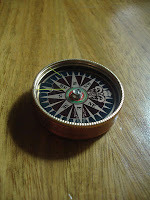 I get annoyed when the GPS tells me to turn right in 50 miles. In 50 miles, nothing happens. Usually, it's a reminder message to not veer onto a different highway by accident. There's not an actual turn. To me, all it really needs to say is, "stay on 64W for the next 150 miles" no matter which way that road veers.
I get annoyed when the GPS tells me to turn right in 50 miles. In 50 miles, nothing happens. Usually, it's a reminder message to not veer onto a different highway by accident. There's not an actual turn. To me, all it really needs to say is, "stay on 64W for the next 150 miles" no matter which way that road veers.
This got me thinking. How much guidance does a reader need?
I know as a reader I do not want to be treated like I'm stupid. And I hate to be manipulated. If I'm reading a story that suggests a big directional change is coming and nothing happens, I'll get annoyed and frustrated.
As a writer, we need to lead our readers to the ultimate end point. It's even okay if they see other characters or story points that make them want to go in a different direction for a moment, as long as they ultimately stay on track. But we need to do so in a way that is entertaining and thought-provoking without spoon-feeding the reader.
But, we can't throw them a bunch of characters and disjointed story and expect them to weed their way through. If you ask them to "take a U-turn when possible" too many times, they might just pick a different place (or book).
Occasionally it steers me wrong, but it's rare. Even then, the nice lady tells me to "take a U-turn when possible" and I still find my way.
What could this experience possibly have taught me about readers? Okay, I'm getting to that.
 I get annoyed when the GPS tells me to turn right in 50 miles. In 50 miles, nothing happens. Usually, it's a reminder message to not veer onto a different highway by accident. There's not an actual turn. To me, all it really needs to say is, "stay on 64W for the next 150 miles" no matter which way that road veers.
I get annoyed when the GPS tells me to turn right in 50 miles. In 50 miles, nothing happens. Usually, it's a reminder message to not veer onto a different highway by accident. There's not an actual turn. To me, all it really needs to say is, "stay on 64W for the next 150 miles" no matter which way that road veers. This got me thinking. How much guidance does a reader need?
I know as a reader I do not want to be treated like I'm stupid. And I hate to be manipulated. If I'm reading a story that suggests a big directional change is coming and nothing happens, I'll get annoyed and frustrated.
As a writer, we need to lead our readers to the ultimate end point. It's even okay if they see other characters or story points that make them want to go in a different direction for a moment, as long as they ultimately stay on track. But we need to do so in a way that is entertaining and thought-provoking without spoon-feeding the reader.
But, we can't throw them a bunch of characters and disjointed story and expect them to weed their way through. If you ask them to "take a U-turn when possible" too many times, they might just pick a different place (or book).
Published on June 14, 2012 20:19
June 13, 2012
Beauty Inside and Out: Editing and Cover Design
My family and I are spending a couple more days at the beach, so it seemed the perfect time to catch up on some of the Author Blog Challenge prompts.
Day 10 Prompt: Have you participated in a critique groups? If so, how did it work out for you? If not, why have you avoided them to this point?
No, I’ve never participated in a formal critique group. I just recently joined one, but I haven’t submitted anything yet. I am my own harshest critic, so I can certainly handle opinions. Since I’ve moved so much, I’ve never tried to connect with an in-person writing/critique group. I’d love to do so, but I also want to build a relationship of trust before embarking on sharing thoughts on others’ writing. That’s why I haven’t shared anything with my current group.
Day 11 Prompt: Describe your editing process. Who edited your book? What was your relationship with your editor like? What could each of you have done to improve it? What might you do differently in the future?
My first book, co-authored with my mom, went through rounds and rounds of editing. First, Mom and I gave it several edits. I do freelance editing and have always had a knack for it, but it’s so hard to edit your own work. We then went to trusted friends, including two former English professors and a journalist, for another round. Finally, we hired a professional editor recommended by the small publishing house that originally picked us up. Still, we ended up finding 32 errors (some the mistake of the publisher, and some so small a lot of people would miss it) once our book was published.
So that we could sleep at night, those darned errors bothered us both so much, we reissued the book sans those errors. I would never say error-free, because I’ve come to believe it’s impossible. I do always feel better when I read traditionally published books and find errors. And it’s very rare that I don’t find some.
Do differently? I’d hire separate editors for story and grammar/punctuation. Both are so needed. And now that I’ve built my writing community, I’d want several beta readers.
Day 12 Prompt: Describe your process for choosing and designing your book cover. Who created your cover? How did you find him/her? What do you love about your cover? What might you do differently next time?
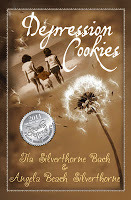 I am fortunate to have a creative family. My sister, Dana Silverthorne Newbrough, designed our cover. She did an amazing job, and I still love it. That being said, I would hire a professional cover designer next time (and take the burden off my dear sister who had to try to please both her older sister and mother).
I am fortunate to have a creative family. My sister, Dana Silverthorne Newbrough, designed our cover. She did an amazing job, and I still love it. That being said, I would hire a professional cover designer next time (and take the burden off my dear sister who had to try to please both her older sister and mother).
My favorite part of the cover for Depression Cookies … the faded picture from way back when of my sisters and me. Since I’m the oldest of three girls and now have three girls of my own, it holds special meaning about the circle of life.
Although I must admit, I'm also pretty darn proud of the Silver medal on our book cover. Our novel was a Silver award winner in the 2011 Readers Favorite Book Awards for Realistic Fiction.
Still, I'd love to know... just how important is a cover in what you decide to read? Has this importance changed since e-books have become so popular (less bookstore book browsing)?
Day 10 Prompt: Have you participated in a critique groups? If so, how did it work out for you? If not, why have you avoided them to this point?
No, I’ve never participated in a formal critique group. I just recently joined one, but I haven’t submitted anything yet. I am my own harshest critic, so I can certainly handle opinions. Since I’ve moved so much, I’ve never tried to connect with an in-person writing/critique group. I’d love to do so, but I also want to build a relationship of trust before embarking on sharing thoughts on others’ writing. That’s why I haven’t shared anything with my current group.
Day 11 Prompt: Describe your editing process. Who edited your book? What was your relationship with your editor like? What could each of you have done to improve it? What might you do differently in the future?
My first book, co-authored with my mom, went through rounds and rounds of editing. First, Mom and I gave it several edits. I do freelance editing and have always had a knack for it, but it’s so hard to edit your own work. We then went to trusted friends, including two former English professors and a journalist, for another round. Finally, we hired a professional editor recommended by the small publishing house that originally picked us up. Still, we ended up finding 32 errors (some the mistake of the publisher, and some so small a lot of people would miss it) once our book was published.
So that we could sleep at night, those darned errors bothered us both so much, we reissued the book sans those errors. I would never say error-free, because I’ve come to believe it’s impossible. I do always feel better when I read traditionally published books and find errors. And it’s very rare that I don’t find some.
Do differently? I’d hire separate editors for story and grammar/punctuation. Both are so needed. And now that I’ve built my writing community, I’d want several beta readers.
Day 12 Prompt: Describe your process for choosing and designing your book cover. Who created your cover? How did you find him/her? What do you love about your cover? What might you do differently next time?
 I am fortunate to have a creative family. My sister, Dana Silverthorne Newbrough, designed our cover. She did an amazing job, and I still love it. That being said, I would hire a professional cover designer next time (and take the burden off my dear sister who had to try to please both her older sister and mother).
I am fortunate to have a creative family. My sister, Dana Silverthorne Newbrough, designed our cover. She did an amazing job, and I still love it. That being said, I would hire a professional cover designer next time (and take the burden off my dear sister who had to try to please both her older sister and mother). My favorite part of the cover for Depression Cookies … the faded picture from way back when of my sisters and me. Since I’m the oldest of three girls and now have three girls of my own, it holds special meaning about the circle of life.
Although I must admit, I'm also pretty darn proud of the Silver medal on our book cover. Our novel was a Silver award winner in the 2011 Readers Favorite Book Awards for Realistic Fiction.
Still, I'd love to know... just how important is a cover in what you decide to read? Has this importance changed since e-books have become so popular (less bookstore book browsing)?
Published on June 13, 2012 04:30
June 12, 2012
How to Write a Book with Your Mom
So many people have asked the same question since Mom and I published our novel,
Depression Cookies
: how do you write a book with your mom?
My answer: Carefully, very carefully.
Just kidding. Actually, writing with Mom felt like the most natural thing in the world to me. We've always had a very open and honest relationship. I might have kept a few things from her in the heat of teenage drama, but not as much as I should have.
Early on, my mother tricked me. She told me she could tell when I was lying because my eyebrows did this funny thing. Gullible, I bought it hook, line and sinker. After a few weak attempts at controlling my eyebrows, I gave up lying to her. Occasionally I'd withhold details, but she cured me of outright lies. Later, she admitted to making up the bit about my eyebrows. Clearly, she's brilliant.
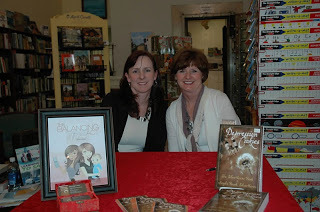
I could go on and on about the special relationship I have with Mom, but instead I'll wrap up my advice in blog-friendly bullet points.
How to Write a Book with Your Mom
(or best friend, sister, etc.)
Frequent Story Sessions
I tend to write by the seat of my pants, as does my mom. But when two people are writing a story and working off each other, that can get a bit chaotic. Mom and I would discuss overall story elements and where we wanted to go. Every few chapters, we would reconvene and discuss where the next few were going. No formal outline, but lots of discussions. These always go better with wine or shopping. Just saying.
When in Doubt, Bring in a Third Party
In most cases, Mom and I saw eye to eye about the story, characters and editing. But when in doubt, we brought in people we both trusted. Granted, this gets a little complicated with a mom-daughter writing team, because my sisters and dad always sided with Mom. (She still makes dinner for my dad and watches my sisters' kids, so this never seemed quite fair.) Kidding aside, stay honest and get help on the tough decisions. We hired a professional editor who was happy to get in the middle and make it a better story.
Trust Each Other
The year I got married was the same year as my parent's 25th wedding anniversary, so naturally I asked them for advice. My dad told me to remember that marriage is about compromise. But he pointed out that rarely did that mean 50-50. Usually, it means someone gets 100% of they want on one issue and vice versa on another. The same is true with a writing partnership, so you have to trust each other. If one writer feels strongly about something, go with it. Trust the strength of conviction. For this to work, both writers have to be completely honest.
Encourage Each Other
The best part about writing as a team is having a built-in source of encouragement, someone who is as dedicated to the project as you are. Whenver life strangled my muse, my mother inspired me to keep going. I did the same for her. We both believed this story needed to be told, so neither of us ever felt alone.
Celebrate Together
All my writing experiences have a-ha moments. Celebrate those together. When the book is done, it will forever be a reminder of the good times and special moments you've shared. Raise your glass and toast each other's successes.
If all else fails, come up with your own version of the eyebrow trick to make sure honesty prevails.
What would your advice be for co-authors? More specifically, would you want to write a book with another writer? Why, why not?
My answer: Carefully, very carefully.
Just kidding. Actually, writing with Mom felt like the most natural thing in the world to me. We've always had a very open and honest relationship. I might have kept a few things from her in the heat of teenage drama, but not as much as I should have.
Early on, my mother tricked me. She told me she could tell when I was lying because my eyebrows did this funny thing. Gullible, I bought it hook, line and sinker. After a few weak attempts at controlling my eyebrows, I gave up lying to her. Occasionally I'd withhold details, but she cured me of outright lies. Later, she admitted to making up the bit about my eyebrows. Clearly, she's brilliant.

I could go on and on about the special relationship I have with Mom, but instead I'll wrap up my advice in blog-friendly bullet points.
How to Write a Book with Your Mom
(or best friend, sister, etc.)
Frequent Story Sessions
I tend to write by the seat of my pants, as does my mom. But when two people are writing a story and working off each other, that can get a bit chaotic. Mom and I would discuss overall story elements and where we wanted to go. Every few chapters, we would reconvene and discuss where the next few were going. No formal outline, but lots of discussions. These always go better with wine or shopping. Just saying.
When in Doubt, Bring in a Third Party
In most cases, Mom and I saw eye to eye about the story, characters and editing. But when in doubt, we brought in people we both trusted. Granted, this gets a little complicated with a mom-daughter writing team, because my sisters and dad always sided with Mom. (She still makes dinner for my dad and watches my sisters' kids, so this never seemed quite fair.) Kidding aside, stay honest and get help on the tough decisions. We hired a professional editor who was happy to get in the middle and make it a better story.
Trust Each Other
The year I got married was the same year as my parent's 25th wedding anniversary, so naturally I asked them for advice. My dad told me to remember that marriage is about compromise. But he pointed out that rarely did that mean 50-50. Usually, it means someone gets 100% of they want on one issue and vice versa on another. The same is true with a writing partnership, so you have to trust each other. If one writer feels strongly about something, go with it. Trust the strength of conviction. For this to work, both writers have to be completely honest.
Encourage Each Other
The best part about writing as a team is having a built-in source of encouragement, someone who is as dedicated to the project as you are. Whenver life strangled my muse, my mother inspired me to keep going. I did the same for her. We both believed this story needed to be told, so neither of us ever felt alone.
Celebrate Together
All my writing experiences have a-ha moments. Celebrate those together. When the book is done, it will forever be a reminder of the good times and special moments you've shared. Raise your glass and toast each other's successes.
If all else fails, come up with your own version of the eyebrow trick to make sure honesty prevails.
What would your advice be for co-authors? More specifically, would you want to write a book with another writer? Why, why not?
Published on June 12, 2012 04:00
June 11, 2012
Something Borrowed, Now to Return It
Years ago, I read Something Borrowed based on a friend's recommendation. It was a light, easy read. Nothing earth-shattering or stick-with-me.
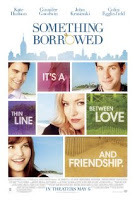 Then the movie came out. It seemed liked the perfect movie for a fun girls' night out. Too bad I had just moved. The other night I caught it on one of the movie channels. I stayed up until midnight watching it.
Then the movie came out. It seemed liked the perfect movie for a fun girls' night out. Too bad I had just moved. The other night I caught it on one of the movie channels. I stayed up until midnight watching it.
Funny, I don't remember being so opinionated about who Rachel ended up with in the book. (In all honesty, I remember very little about the book.)
Long story short... Rachel has been in love with her best friend, Dex, since law school, yet she never told him. He meets her best friend and they end up engaged. During the engagement activities, Rex and Rachel feel drawn to one another again and start strolling down memory lane.
Maybe the movie was a poorly adapted version of the book, which is too often the case with books-turned-movies. Or, maybe I read the book and got swept away. I don't remember, but I was so annoyed with Dex and Rachel that I wanted to throw my remote at the screen. Did they get together? Yes. Did I want them to? No.
I wanted more for Rachel than some guy who could only fall for her once he fell for someone else. Even with the eye candy that is Colin Egglesfield, Dex was a ruined character. Instead, I found myself wanting Rachel to end up with her best friend, Ethan. Sadly, she did to him what Rex initially did to her. She broke his heart.
Why all this pontificating on a movie? I find why characters and story do and don't work fascinating. The book didn't offend me, the movie did. I don't even remember the character of Ethan from the book, but I was besotted with him in the movie version. There's a study to be done here.
The winners in this. Emily Giffin, who sold me a story that producers couldn't, and John Krasinski, who created an Ethan I could sink my teeth into. No pun intended.
When a book/movie annoys you, do you try to figure out why? Or do you simply chalk it up to preference and mood?
 Then the movie came out. It seemed liked the perfect movie for a fun girls' night out. Too bad I had just moved. The other night I caught it on one of the movie channels. I stayed up until midnight watching it.
Then the movie came out. It seemed liked the perfect movie for a fun girls' night out. Too bad I had just moved. The other night I caught it on one of the movie channels. I stayed up until midnight watching it.Funny, I don't remember being so opinionated about who Rachel ended up with in the book. (In all honesty, I remember very little about the book.)
Long story short... Rachel has been in love with her best friend, Dex, since law school, yet she never told him. He meets her best friend and they end up engaged. During the engagement activities, Rex and Rachel feel drawn to one another again and start strolling down memory lane.
Maybe the movie was a poorly adapted version of the book, which is too often the case with books-turned-movies. Or, maybe I read the book and got swept away. I don't remember, but I was so annoyed with Dex and Rachel that I wanted to throw my remote at the screen. Did they get together? Yes. Did I want them to? No.
I wanted more for Rachel than some guy who could only fall for her once he fell for someone else. Even with the eye candy that is Colin Egglesfield, Dex was a ruined character. Instead, I found myself wanting Rachel to end up with her best friend, Ethan. Sadly, she did to him what Rex initially did to her. She broke his heart.
Why all this pontificating on a movie? I find why characters and story do and don't work fascinating. The book didn't offend me, the movie did. I don't even remember the character of Ethan from the book, but I was besotted with him in the movie version. There's a study to be done here.
The winners in this. Emily Giffin, who sold me a story that producers couldn't, and John Krasinski, who created an Ethan I could sink my teeth into. No pun intended.
When a book/movie annoys you, do you try to figure out why? Or do you simply chalk it up to preference and mood?
Published on June 11, 2012 04:30
June 10, 2012
Lessons from John Carter: ROW80 Update
This post is coming in at the last minute. The girls and I are in Duck, North Carolina until Wednesday evening enjoying family and quality time. The next two days of posts are written, and I am going to take a few days to rejuvenate my muse.
That is my one goal for the next few days (okay, I might slip in some social media catch up time and some reading). Three months of blogging challenges, wrapping up school for three kids, and handling medical and other dramas left me drained and mentally exhausted. I am ready to make a comeback on the writing front, but I need to shake off the stress first.
I wrote my own prescription... family beach trip. Mom, Dad, my two sisters, and my five nieces. This is my first time meeting the youngest niece (who will be five months old on 6/17). It's the most beautiful chaos I've had in months.
So what does this have to do with John Carter? We all sat down to watch the movie, the little ones already asleep. I wondered why it tanked at the box office, especially with all the hype. I wonder no more.
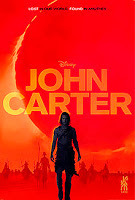 Story Lessons from John Carter
Story Lessons from John Carter
Eye Candy Will Only Get You So Far
Taylor Kitsch. Gorgeous, yet he was not enough to make this movie memorable. I always hear that agents want to represent a marketable book. Too often, authors write according to their perceived notion of marketability. All the marketability markers were there for this movie, but it still failed.
Write Your Story (Don't Retell Someone Else's)
Edgar Rice Burroughs created the John Carter character through a series of books. He also created Tarzan. Many authors site him as an early influence, particularly in science fiction. Yet the movie was jumbled, unable to elevate from interesting concept to great movie. Whoever was behind this movie couldn't bring to life well-written characters and story. Maybe it simply wasn't their passion.
As authors, we should write the stories we believe in. No matter how popular vampires are right now, we can't all write paranormal. Do you love to write Chick Lit? Some people hate it. Write it anyway. Readers will come if the story is well done and the characters are memorable.
Interesting Note (from Wikipedia): In 1923 Burroughs set up his own company, Edgar Rice Burroughs, Inc., and began printing his own books through the 1930s. (An author before his time, hmmm.)
Don't Judge a Piece by Its Popularity
This is a lesson John Carter exemplifies, but one I've always believe in. Usually the more hyped the book or movie, the less I end up liking it. Oscar nominated movies rarely end up as my favorites, but sometimes the most panned ones will. Same with books. The less expectation, the more I can have a true reaction. Odds are, this movie couldn't live up to the hype, even if it was better.
I love GoodReads and reading reviews, but as readers we have to trust our guts sometimes and take a chance.
Listen to Beta Readers
Supposedly this movie didn't do well with test audiences. It's never too late to make changes and improve story. That's not to say it's easy. Put what you think is your final draft in the hands of trustworthy readers so your actual final draft is even better.
Did you see John Carter? Will you?
I'm looking forward to catching up on my A Round of Words in 80 Days friends and continuing to make new connections through the Author Blog Challenge.
I will resume writing on my two novels next Thursday, and I hope the break will inspire my muse to come out swinging.
That is my one goal for the next few days (okay, I might slip in some social media catch up time and some reading). Three months of blogging challenges, wrapping up school for three kids, and handling medical and other dramas left me drained and mentally exhausted. I am ready to make a comeback on the writing front, but I need to shake off the stress first.
I wrote my own prescription... family beach trip. Mom, Dad, my two sisters, and my five nieces. This is my first time meeting the youngest niece (who will be five months old on 6/17). It's the most beautiful chaos I've had in months.
So what does this have to do with John Carter? We all sat down to watch the movie, the little ones already asleep. I wondered why it tanked at the box office, especially with all the hype. I wonder no more.
 Story Lessons from John Carter
Story Lessons from John CarterEye Candy Will Only Get You So Far
Taylor Kitsch. Gorgeous, yet he was not enough to make this movie memorable. I always hear that agents want to represent a marketable book. Too often, authors write according to their perceived notion of marketability. All the marketability markers were there for this movie, but it still failed.
Write Your Story (Don't Retell Someone Else's)
Edgar Rice Burroughs created the John Carter character through a series of books. He also created Tarzan. Many authors site him as an early influence, particularly in science fiction. Yet the movie was jumbled, unable to elevate from interesting concept to great movie. Whoever was behind this movie couldn't bring to life well-written characters and story. Maybe it simply wasn't their passion.
As authors, we should write the stories we believe in. No matter how popular vampires are right now, we can't all write paranormal. Do you love to write Chick Lit? Some people hate it. Write it anyway. Readers will come if the story is well done and the characters are memorable.
Interesting Note (from Wikipedia): In 1923 Burroughs set up his own company, Edgar Rice Burroughs, Inc., and began printing his own books through the 1930s. (An author before his time, hmmm.)
Don't Judge a Piece by Its Popularity
This is a lesson John Carter exemplifies, but one I've always believe in. Usually the more hyped the book or movie, the less I end up liking it. Oscar nominated movies rarely end up as my favorites, but sometimes the most panned ones will. Same with books. The less expectation, the more I can have a true reaction. Odds are, this movie couldn't live up to the hype, even if it was better.
I love GoodReads and reading reviews, but as readers we have to trust our guts sometimes and take a chance.
Listen to Beta Readers
Supposedly this movie didn't do well with test audiences. It's never too late to make changes and improve story. That's not to say it's easy. Put what you think is your final draft in the hands of trustworthy readers so your actual final draft is even better.
Did you see John Carter? Will you?
I'm looking forward to catching up on my A Round of Words in 80 Days friends and continuing to make new connections through the Author Blog Challenge.
I will resume writing on my two novels next Thursday, and I hope the break will inspire my muse to come out swinging.
Published on June 10, 2012 20:47
June 9, 2012
Saturday Musings: Ideas, Plans, and Research
Happy weekend. My girls and I are recovering from the last days of school at the beach in Duck, North Carolina.
Saturdays are a good day for catch up, so I'm going to respond to a few of the Author Blog Challenge prompts that I've missed.
Describe how the idea for your book first came to you. Where were you? Who was the first person you told? How did they respond?
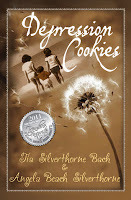 I always loved writing and reading and the idea of writing a book was always in the back of my mind. But it was the journey into the unknown called motherhood that spurred me to action. Overwhelmed with a new baby and living far away from my mother, a family story started brewing.
I always loved writing and reading and the idea of writing a book was always in the back of my mind. But it was the journey into the unknown called motherhood that spurred me to action. Overwhelmed with a new baby and living far away from my mother, a family story started brewing.
Then it hit me... I wanted to write a mother-daughter tale with my mother. Two women writing women. It would be the perfect gift for my precious daughter. Mom was game and we went for it. Thanks to life (two more children in four years for me), Depression Cookies took ten years from thought to publication.
Describe your outline process for your book. What do you do to stay organized?
I am currently writing two books. Mom and I are writing the follow up to Depression Cookies, and I am writing a young adult book. Mom and I have such a mother-daughter outline process, it's called chatting on the phone and working it out. Plus, we know our characters so well at this point, it comes naturally.
On my YA book, I am still playing around with outlining. It's my first solo-writing effort. I furiously jot down notes as ideas come to me. I use note cards for different scenes, and I have a Word document filled with scene ideas, character descriptions, and story arc.
I love reading all the story organization suggestions by other writers. Now I just have to find my own groove.
Describe the research process for your book. Did you interview people? Travel? How prominent a role did the Internet play? If you didn’t do new research, how did you learn what you needed to know to write your book?
I am spoiled by the Internet, I must admit. But nothing beats first-hand experience, so I do look for experts in the field as well. When I started blogging, I never dreamed that it would open the connections it has. When I have a burning question, I put it out there. It's like six degrees of Kevin Bacon, somebody always knows somebody you need.
I'm loving the Author Blog Challenge and meeting so many wonderful writers. I'm hoping to use my beach time to catch up on my blog reading and commenting.
*****
If you love a book, do you want to know the author's story? How many times have you searched for information on an author?
Saturdays are a good day for catch up, so I'm going to respond to a few of the Author Blog Challenge prompts that I've missed.
Describe how the idea for your book first came to you. Where were you? Who was the first person you told? How did they respond?
 I always loved writing and reading and the idea of writing a book was always in the back of my mind. But it was the journey into the unknown called motherhood that spurred me to action. Overwhelmed with a new baby and living far away from my mother, a family story started brewing.
I always loved writing and reading and the idea of writing a book was always in the back of my mind. But it was the journey into the unknown called motherhood that spurred me to action. Overwhelmed with a new baby and living far away from my mother, a family story started brewing. Then it hit me... I wanted to write a mother-daughter tale with my mother. Two women writing women. It would be the perfect gift for my precious daughter. Mom was game and we went for it. Thanks to life (two more children in four years for me), Depression Cookies took ten years from thought to publication.
Describe your outline process for your book. What do you do to stay organized?
I am currently writing two books. Mom and I are writing the follow up to Depression Cookies, and I am writing a young adult book. Mom and I have such a mother-daughter outline process, it's called chatting on the phone and working it out. Plus, we know our characters so well at this point, it comes naturally.
On my YA book, I am still playing around with outlining. It's my first solo-writing effort. I furiously jot down notes as ideas come to me. I use note cards for different scenes, and I have a Word document filled with scene ideas, character descriptions, and story arc.
I love reading all the story organization suggestions by other writers. Now I just have to find my own groove.
Describe the research process for your book. Did you interview people? Travel? How prominent a role did the Internet play? If you didn’t do new research, how did you learn what you needed to know to write your book?
I am spoiled by the Internet, I must admit. But nothing beats first-hand experience, so I do look for experts in the field as well. When I started blogging, I never dreamed that it would open the connections it has. When I have a burning question, I put it out there. It's like six degrees of Kevin Bacon, somebody always knows somebody you need.
I'm loving the Author Blog Challenge and meeting so many wonderful writers. I'm hoping to use my beach time to catch up on my blog reading and commenting.
*****
If you love a book, do you want to know the author's story? How many times have you searched for information on an author?
Published on June 09, 2012 03:00
June 8, 2012
Ray Bradbury: Fun Facts Friday
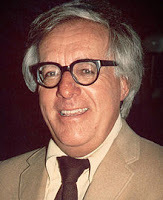 From WikipediaRest in peace, Ray Bradbury.
From WikipediaRest in peace, Ray Bradbury. This week Ray Bradbury passed away at 91. According to the LA Times: Author of more than 27 novels and story collections—most famously "The Martian Chronicles," "Fahrenheit 451," "Dandelion Wine" and "Something Wicked This Way Comes"—and more than 600 short stories, Bradbury has frequently been credited with elevating the often-maligned reputation of science fiction . Some say he singlehandedly helped to move the genre into the realm of literature. (Source: LA Times Online)
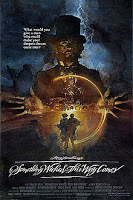 From WikipediaAlthough I haven't read any Bradbury, something I plan to remedy, I was completely freaked out by the movie adaption of his Something Wicked This Way Comes. With his passing, I wanted to devote my Fun Facts Friday segment to him.
From WikipediaAlthough I haven't read any Bradbury, something I plan to remedy, I was completely freaked out by the movie adaption of his Something Wicked This Way Comes. With his passing, I wanted to devote my Fun Facts Friday segment to him.First some quotes...
“Don't think. Thinking is the enemy of creativity. It's self-conscious, and anything self-conscious is lousy. You can't try to do things. You simply must do things.”
“You must stay drunk on writing so reality cannot destroy you.”
“If we listened to our intellect, we'd never have a love affair. We'd never have a friendship. We'd never go into business, because we'd be cynical. Well, that's nonsense. You've got to jump off cliffs all the time and build your wings on the way down.”
Just from the quotes alone, I am a fan. I needed to read all of these when I was writing my post, My Monster Rises. He's right... we should all dedicate ourselves to what we love, and then not let anyone or anything stop us. Some interesting facts about Ray Bradbury
1. His distant relative, Mary Bradbury, was tried as a witch and burned at the stake in Salem, Massachusetts.
2. He won the Pulitzer Prize.
3. He and his wife, Maggie, had four daughters.
4. He has a star on the Hollywood Walk of Fame.
5. He had a lifelong habit of writing every day.
6. He died on the same day as the rare transit of Venus.
The last one struck me, especially for a science fiction writer.
Of the above facts and quotes, which speaks to you the most?
Published on June 08, 2012 04:00
June 7, 2012
5 Writing "Mistakes" I Like
Monday's post highlighted my Top 10 Writing Pet Peeves, so it seemed only fitting that I follow it up with some "mistakes" I find appealing.
5 Writing "Mistakes" I Like
Sentence Fragments
I can't think of one English teacher back in the day who would have tolerated sentence fragments. Every time I use one, I imagine it circled in red with a sad face. But I find myself drawn to them for emphasis. Short and powerful.
 Starting a Sentence with And or But
Starting a Sentence with And or But
I'm seeing red marks again. Teachers hated this, probably still do. I see the allure, I must admit. Sure, it can get gimmicky and overused. But a well-placed and or but sentence starter can stand strong alone, instead of getting lost in a compound sentence.
Adverbs
The road to hell is paved with adverbs. Stephen King
I disagree, with a caveat. They should be used sparingly and powerfully. Despite King's famous quote and my utmost respect for him, I think the road to hell is paved with poor editing. A well-used adverb won't jar me as a reader like a pretentious verb will. And they are a must in dialogue. Let's be fair, people love their adverbs.
Just
Maybe it's because I'm from the south and we love our justs, but sometimes just just says it all. Please, if you have a southern character, use it. If you want a southern character in your writing and have never visited the south, please contact me. I'm from there, and my mother is from Georgia. Like all things we love, don't overdo it. Chocolate's not bad for you in moderation. Neither is just.
Ending a Sentence with a Preposition
Grammar purists, and I consider myself darn close to one, everywhere just cringed. This is something, however, I can simply put up with. Even wrap my head around. Again, my southern upbringing might be to blame. Sometimes, it sounds pretentious and over the top to work around preposition endings. But I do hate when people ask, "Where you going to?" when a simple "Where are you going?" would suffice. But if you have a deep-south character, do the first sentence. Trust me (see just example above).
Note: All of these mistakes I like in fiction and creative writing. Journalism has always been, and should be, a different breed of writing. It's a follow-the-rules kind of game.
What writing "mistakes" do you like?
5 Writing "Mistakes" I Like
Sentence Fragments
I can't think of one English teacher back in the day who would have tolerated sentence fragments. Every time I use one, I imagine it circled in red with a sad face. But I find myself drawn to them for emphasis. Short and powerful.
 Starting a Sentence with And or But
Starting a Sentence with And or ButI'm seeing red marks again. Teachers hated this, probably still do. I see the allure, I must admit. Sure, it can get gimmicky and overused. But a well-placed and or but sentence starter can stand strong alone, instead of getting lost in a compound sentence.
Adverbs
The road to hell is paved with adverbs. Stephen King
I disagree, with a caveat. They should be used sparingly and powerfully. Despite King's famous quote and my utmost respect for him, I think the road to hell is paved with poor editing. A well-used adverb won't jar me as a reader like a pretentious verb will. And they are a must in dialogue. Let's be fair, people love their adverbs.
Just
Maybe it's because I'm from the south and we love our justs, but sometimes just just says it all. Please, if you have a southern character, use it. If you want a southern character in your writing and have never visited the south, please contact me. I'm from there, and my mother is from Georgia. Like all things we love, don't overdo it. Chocolate's not bad for you in moderation. Neither is just.
Ending a Sentence with a Preposition
Grammar purists, and I consider myself darn close to one, everywhere just cringed. This is something, however, I can simply put up with. Even wrap my head around. Again, my southern upbringing might be to blame. Sometimes, it sounds pretentious and over the top to work around preposition endings. But I do hate when people ask, "Where you going to?" when a simple "Where are you going?" would suffice. But if you have a deep-south character, do the first sentence. Trust me (see just example above).
Note: All of these mistakes I like in fiction and creative writing. Journalism has always been, and should be, a different breed of writing. It's a follow-the-rules kind of game.
What writing "mistakes" do you like?
Published on June 07, 2012 05:01
June 6, 2012
My Monster Rises: ROW80 Update
Several of my writer buddies have signed contracts lately, either with agents or publishers or both. While I'm insanely happy for them, these moments allow the dreaded insecurity monster to creep into my brain. This monster hates my muse and runs her off at every given opportunity.
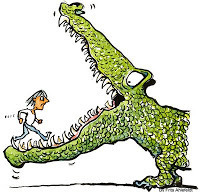 My route to writing was natural, but not academic. Writing has always been second nature. Growing up, teachers told me I had a knack for writing and grammar/punctuation. The product of an engineer father and a poet mother, I majored in finance but took every English elective I could fit in my schedule.
My route to writing was natural, but not academic. Writing has always been second nature. Growing up, teachers told me I had a knack for writing and grammar/punctuation. The product of an engineer father and a poet mother, I majored in finance but took every English elective I could fit in my schedule.
Until last week, I'd never been a member of an in-person writing group. My first novel, co-authored with my mother, was a passion project and took ten years. Although it was well-received, my monster convinces me that it was a fluke.
I wonder if I should get a Masters Degree in Creative Writing, take more writing courses, and/or throw myself into all things author. In the last year, I have embraced the writing community. I've discovered some talented writers and amazing books. Sometimes I find this encouraging, other times my monster uses it to make me question my own writer status.
I'm left wondering, who the hell do I think I am?
Then, I'll pick up a book with obvious and upsetting editing issues or a boring story, and my muse will start to take over again. I can do this. Yes I can. Yes I can.
Now to find the balance. The highs and lows of writing have really surprised me. When I was in the closet, there was no pressure or worry. I wrote for the pure love of writing. Now that I've declared myself an author, my monster lurks around every review, critique, blog post, wordcount, and so on.
Knowledge may be power, but it's also overwhelming. There are so many how-to articles on writing good novels and row after row of craft books. Am I supposed to read them all, consider them all when I write? My head is spinning. Sometimes I miss the days of writing in a vacuum. Now I feel like my writing is an open wound.
Where do you turn when the insecurity monster takes over?
*****
My A Round of Words in 80 Days (ROW80) Update
Writing: I struggled to write 1,019 words toward my WIP this week. I'm proud that I didn't give up, but I'd like the wide-eyed optimism and confidence of the pre-publication girl back.
Reading: Just finished two amazing books. Both reviews will be up this week on Mom in Love with Fiction. (These two books coupled with several writer friends signing contracts lately have created the perfect environment for the monster to take over.)
Blogging: Daily.
Social Media: I'm struggling to stay above water. It's such a time sucker, although a productive one. Time is cowering in a corner with my muse lately.
Editing: Insecurity is taking over here, too. I think I'm helpful and have an "eye" for errors and missing story elements, but I've never actually done a beta read or critique in a writing group setting. I'm wondering if I need some classes to gain confidence, and not just trust my "knack" for editing. So many questions lately.
Many congratulations to my newly contracted/signed writing buddies. I couldn't be happier. The writer side of me respects your achievement and journey, and the reader side of me can't wait to read your books!
 My route to writing was natural, but not academic. Writing has always been second nature. Growing up, teachers told me I had a knack for writing and grammar/punctuation. The product of an engineer father and a poet mother, I majored in finance but took every English elective I could fit in my schedule.
My route to writing was natural, but not academic. Writing has always been second nature. Growing up, teachers told me I had a knack for writing and grammar/punctuation. The product of an engineer father and a poet mother, I majored in finance but took every English elective I could fit in my schedule. Until last week, I'd never been a member of an in-person writing group. My first novel, co-authored with my mother, was a passion project and took ten years. Although it was well-received, my monster convinces me that it was a fluke.
I wonder if I should get a Masters Degree in Creative Writing, take more writing courses, and/or throw myself into all things author. In the last year, I have embraced the writing community. I've discovered some talented writers and amazing books. Sometimes I find this encouraging, other times my monster uses it to make me question my own writer status.
I'm left wondering, who the hell do I think I am?
Then, I'll pick up a book with obvious and upsetting editing issues or a boring story, and my muse will start to take over again. I can do this. Yes I can. Yes I can.
Now to find the balance. The highs and lows of writing have really surprised me. When I was in the closet, there was no pressure or worry. I wrote for the pure love of writing. Now that I've declared myself an author, my monster lurks around every review, critique, blog post, wordcount, and so on.
Knowledge may be power, but it's also overwhelming. There are so many how-to articles on writing good novels and row after row of craft books. Am I supposed to read them all, consider them all when I write? My head is spinning. Sometimes I miss the days of writing in a vacuum. Now I feel like my writing is an open wound.
Where do you turn when the insecurity monster takes over?
*****
My A Round of Words in 80 Days (ROW80) Update
Writing: I struggled to write 1,019 words toward my WIP this week. I'm proud that I didn't give up, but I'd like the wide-eyed optimism and confidence of the pre-publication girl back.
Reading: Just finished two amazing books. Both reviews will be up this week on Mom in Love with Fiction. (These two books coupled with several writer friends signing contracts lately have created the perfect environment for the monster to take over.)
Blogging: Daily.
Social Media: I'm struggling to stay above water. It's such a time sucker, although a productive one. Time is cowering in a corner with my muse lately.
Editing: Insecurity is taking over here, too. I think I'm helpful and have an "eye" for errors and missing story elements, but I've never actually done a beta read or critique in a writing group setting. I'm wondering if I need some classes to gain confidence, and not just trust my "knack" for editing. So many questions lately.
Many congratulations to my newly contracted/signed writing buddies. I couldn't be happier. The writer side of me respects your achievement and journey, and the reader side of me can't wait to read your books!
Published on June 06, 2012 06:00



